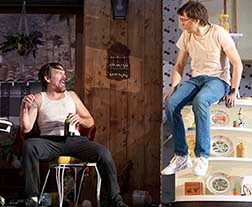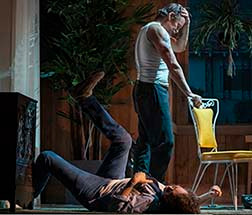| "True
West” by Sam Shepard is a 1980 too over-the-top satire of
movies
 |
| Ethan Hawke as the drinking brother
Lee and Paul Dano as Austin. Photo by Joan Marcus. |
Opened
Jan 24, 2019, closes March 17, 2019.
Written by Sam Shepard, directed by James Macdonald.
Roundabout Theatre Company at American Airlines Theatre, 227 West
42nd Street, New York City
212-719-1300; https://www.roundabouttheatre.org/
Reviewed by Lucy Komisar Feb 1, 2019.
A satire about media ought always to be in fashion.
The current revival of the film "Network” as a play works
brilliantly to skewer corrupt television.
This revival of Sam Shepard's satire about the Hollywood movie business
doesn't hit that mark. Maybe it worked in 1980 when it premiered,
but nearly 40 years later, it's too over-the-top. Interesting as
a piece of the times.
The stage is framed by lights that turn the set into a screen. This
is the "real” west, southern California style. The title
is a take both on the locale and also, we will discover, about making
movies. Playwright Sam Shepard, who died in 2017, had a not always
wonderful experience writing scripts in Hollywood. So consider this
one about a film he would not have written.
The centerpiece is a faceoff between two brothers, one clean-cut
Austin (Paul Dano) a screen writer with a mild, almost milquetoast
demeanor. The other is scruffy bearded Lee (Ethan Hawke), who once
made money with a pit bull in dog fights and talks in either a threat
or a sneer.
Austin is housesitting his mother's California place while she is
on an Alaska vacation. Lee arrives with no notice. They have at
various times visited their father (divorced), somewhere in the
San Gabriel desert, a bit drunk, crazy or odd, a trait he seems
to have passed down.
The brothers are clear opposites, or are they? Does each have a
little bit of the other inside? Supposedly as a youth Austin admired
Lee as an adventurer, and Lee admired Austin for being in college.
But I didn't feel any of that.
The plot unwinds in a takeoff that seems TV sitcom. Austin is working
by candlelight on a script. Lee, largely to amuse himself and to
challenge Austin, borrows his car to embark on some neighborhood
burglary, returning with a TV set.
But Lee can steal more than televisions. Austin is about to get
a visit from a producer (Gary Wilmes, wonderfully brainless Hollywood)
interested in his script. Austin asks Lee to leave the house before
the meeting, but Lee has another idea. Turns out he has a story
to tell. He finagles the producer into inviting him to play golf.
He returns in the morning with a bag of clubs and swings some expertly.
Guess who gets a picture deal! Lee is a hustler! So, we learn that
this is how movie scripts are bought.
 |
| Paul Dano as Austin and Ethan Hawke
as Lee, in moment of despair. Photo by Joan Marcus. |
Lee and the producer want Austin to write the script. He is angry,
refuses, and Lee sits and types a finger at a time. But Austin needs
the money, so he sits at his typewriter (this is an old play, 1980)
taking down the tale of two guys in trucks, one chasing the other
through the desert. They are about to run out of gas, but they have
horses in vans to continue the chase. Austin says the story doesn't
make sense. Lee says it's a move, not a film. There's a big difference.
In the US we make movies, leave the films to the French. You wonder
what "movies” Shepard was thinking of.
A few forced bons mots: Austin, taking dictation, translates, "I
know this prairie like the back of my hand.” Lee complains,
"It's what you call it a cliché.” Austin changes
it to, "I am on intimate terms with this prairie.”
At one point in the goings-on, an angry Lee smashes the typewriter.
More will get smashed. I know this is satire, but too much is just
slapstick. Though director James Macdonald handles that well, as
any TV sitcom director would. Actually, Macdonald is pretty good
all-around with the overloaded tension.
However, the plot line diverges too lavishly from the plausible.
Why does Austin give Lee car keys when he knows he will rob houses?
Or agree to write his story, by longhand on a yellow pad, after
the typewriter is knocked to bits? He is supposed to feel some filial
connection, but as Dano plays Austin, you never feel any.
And it's also hard to believe that Hawk's Lee, who looks as if he
should grunt instead of talk, has the ability to envision even a
crude movie. Or sweet-talk a producer. But maybe that was Shepard's
point.
Yes, I know it's a satire, and it may have worked better in the
80s, but now it shouldn't hit you so squarely between the eyes.
Visit Lucy's website: http://thekomisarscoop.com
|



